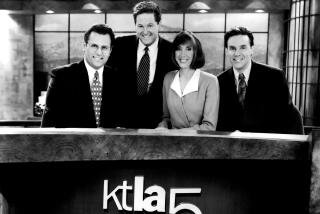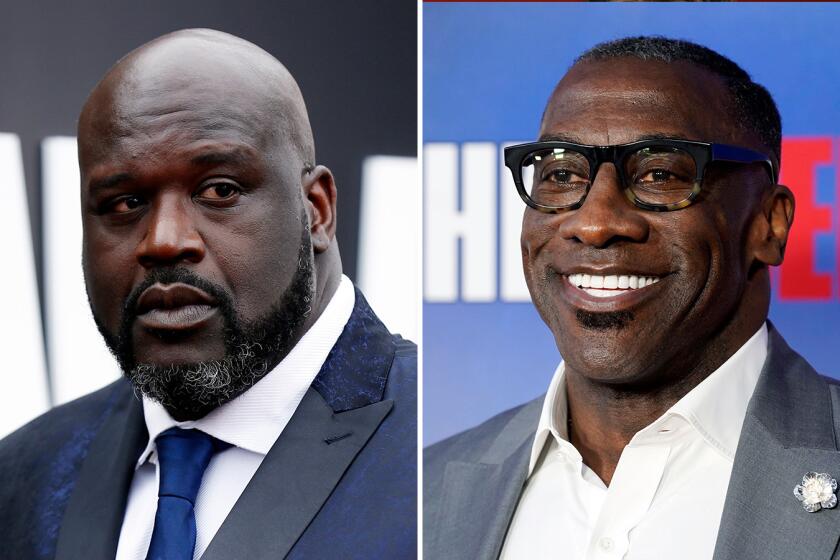To Reclaim Power, Creative Types Need to Be Just That
Fancy restaurants are still doing brisk lunch business, but an informal survey of the writers, producers and managers consuming those Cobb salads reveals many are overcome by indigestion when they ponder where the television business is heading.
Although TV was once a writer-creator’s medium, the prevailing sense is the corporate suits have snatched the industry away from them. Alternative formats such as “Survivor,” “Big Brother” and “Who Wants to Be a Millionaire” have spread like a virus across precious prime-time real estate. Network interference in programming decisions has grown more onerous, in part because the network and production company--which once might have battled over a writer’s vision--are now often one and the same.
Creativity, in an era of corporate synergy, takes a back seat to commerce. Anxious networks may give chunks of prime-time to a few anointed writer-producers, but those outside that golden circle scrounge to stay employed--before, that is, seemingly inevitable strikes by the unions representing writers and actors next year un-employ everyone who isn’t working on so-called reality shows.
So in the spirit of the political convention that just left town, with its assorted speeches and protests, here’s a novel thought for the writers and wannabes grumbling about how the television business is going to hell in a handbasket: Creative people of the world, unite. Get off those ergonomic chairs and take your industry back.
If there is any chance of leveling a playing field skewed in favor of media giants, creative types must prove they’re not willing to accept business as usual. This means circumventing the networks, seeking other sources of financing and gambling on new ventures such as the Internet.
Granted, it’s not my money, and the corporate icebergs capable of rolling over all in their path have a massive head start. Moreover, some studios are now trying to obtain rights to what writers create for new media when they sign talent to production deals, extending their dominion to cyberspace as well.
Some in Hollywood’s creative community are nevertheless trying to break this stranglehold--the one that says Disney, as just one example, will own, shape and control pretty much everything broadcast on ABC. They are taking chances many view as liberating after toiling on the focus-group driven, overly massaged “product” networks are most comfortable serving up.
These efforts vary wildly in size and scope and venture capital. Yet having recently visited just two of them, it was hard not to notice a sense of vitality and enthusiasm you won’t find in many network hallways these days.
Burbank-based Z.com has the support of two top talent managers, 3 Arts Entertainment and Brillstein-Grey Entertainment, who--finding deal-making with likes of News Corp. and Viacom increasingly challenging--view the site as a new outlet for writers and actors they represent.
Icebox.com, meanwhile, has become a haven for disenchanted television writers, able to cut loose in three-minute comedic vignettes with names like “Zombie College” and “Hard Drinkin’ Lincoln,” the latter showing a side of the 16th president you won’t find in any history books.
According to co-founder Steve Stanford, Icebox offers writers creative latitude truly meaningful to people accustomed to “having the things they’re passionate about eviscerated by the traditional media. . . . We think we’ve got great storytellers who, when given unfettered freedom, can come up with high-quality entertainment. It really is a ‘united artists’-type approach.”
On a lesser scale, there are writers like Stephanie Phillips and Mark Amato, who came through the current TV “staffing season” without landing jobs on a series--victimized in part, in their view, by Regis Philbin’s profligacy.
Rather than sulk, they decided to put their energy into launching their own Web site, dailyanxiety.com, spoofing the Hollywood trade Daily Variety--whose pages, announcing some new “reality” show almost every day, provide their scribbling brethren a steady diet of Maalox moments.
“Right now, every single person I know [in show business] is having a nervous breakdown. It is apocalyptic, and I’m scared,” Phillips said. “We figured rather than crying, ‘ ‘Millionaire’ is on, ‘Survivor’ is on, woe is the comedy writer,’ we’d take it into our own hands.”
Of course, there are dozens of these sites out there, and as with virtually any form of entertainment, most will fail. While the Internet and other new methods of distributing content may eventually render the coercive power of the network-studios moot, the process is slow, and the technology, while impressive, won’t bring about the much-anticipated revolution soon enough to put anybody’s middle-school student through college. Until enough folks embrace this new technology, it’s going to require courage and plenty of luck to--in “Survivor” parlance--outwit, outlast and outplay the present system.
Beyond the obvious allure of possible dot-com riches, writers have a real incentive to take that risk. Many have surmised that the companies paying for their talents harbor no great love in their top echelons for what they produce--seeing their sitcoms and dramas simply as widgets (it’s telling how often executives use the word “product” to describe their shows) on a global assembly line.
Indeed, the major networks appear quite ready to get by without scripted programming or actors next year, hedging against the potential strikes by ordering “reality” shows at a pace that could afford every American Andy Warhol’s promised 15 minutes of fame by 2002.
Clearly, anyone expecting the studios to cave in to the unions out of love for art hasn’t been following current events closely. If writers and performers are waiting for the public to rise up on their behalf, they can forget that, too. Rightly or wrongly, most people see the dispute--assuming they pay any attention at all--as a battle between millionaires and billionaires and couldn’t care less.
There is something larger at stake here, however, a more nebulous question of what happens when prime time--that bastion of the best television has to offer--becomes “All ‘Big Brother,’ all the time.” The answer is anybody’s guess, but based on the drift of these shows into increasingly absurd variations on the ordinary people-in-ridiculous-situation theme, no one who cares about TV or its viewers should be in any great hurry to find out.
This may sound suspiciously like a call to action--urging those who create our prime-time fantasies to defiantly toss their laptop computers into Boston harbor or hitch up a wagon and explore the new frontier. And in a sense, it is.
So get out pitchforks and light some torches. Because there are monsters out there in Hollywood, and only an angry mob--even a rich, well-fed one--can hope to bring them under control.
*
Brian Lowry’s column appears on Tuesdays. He can be reached at brian.lowry@latimes.com.
More to Read
The biggest entertainment stories
Get our big stories about Hollywood, film, television, music, arts, culture and more right in your inbox as soon as they publish.
You may occasionally receive promotional content from the Los Angeles Times.






